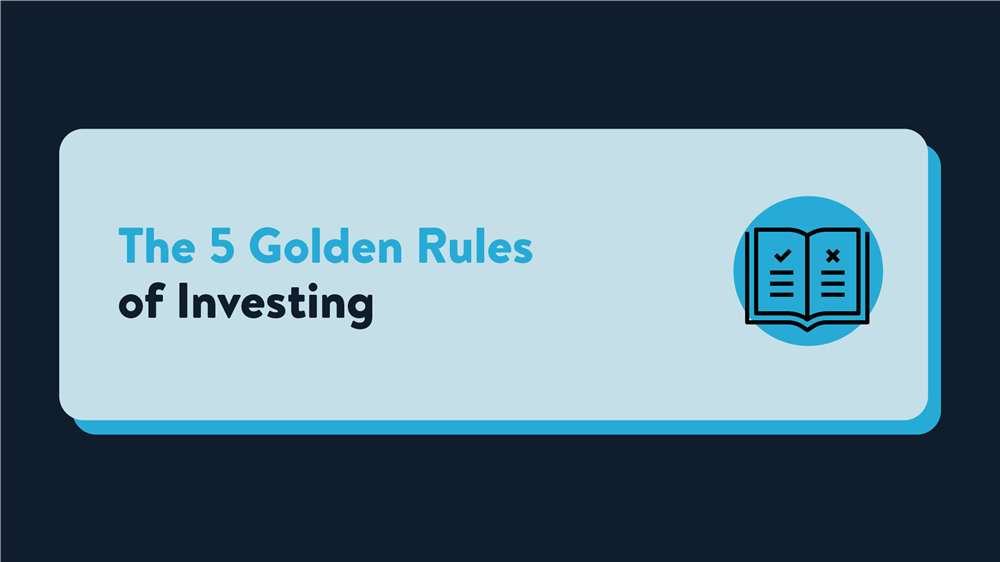When it comes to making the most of your money, not all that glitters is gold. From get-rich-quick-schemes to the minefield of “side hustles”, the path to better finances can sometimes appear risky.
Fortunately, investing is one way to unlock your money’s potential — without any snake oil salesman or monetised hobbies, no less.
And, while it’s totally normal to feel intimidated when first getting started with investing, the truth is that you don’t have to be.
These days, investing is very different to the suited-and-booted fanfare we see in the movies. There aren’t any larger-than-life traders or ominously ticking stock indexes to deal with.
In fact, investing is a process you can begin from the comfort of your own home.
It appeals to many as an avenue for potentially beating inflation, as well as the possibility of growing long-term wealth. Of course, capital is always at risk with investing, and you could get back less than you put in.
Finding the confidence to begin is half the battle. That’s why we’ve put together the five golden rules of investing to steady you on your way.
- Only what you can afford to lose
- Emergency funds
- Diversification
- Invest long-term
- Tax-efficient investing
- How to start investing
1. Only invest what you can afford to lose
There’s no point beating about the bush: to get the best out of your money and protect your own financial stability, you shouldn’t invest money that you can’t afford to lose.
The markets dictate financial returns – whether good or bad – and the associated peaks and troughs are shaped by a whole variety of things. These can include:
- Supply and demand: Simply put, if the price of goods rise, then the demand for them drops (and vice versa).
- Interest rates: When interest rates go up, there’s a knock-on effect with both consumers and businesses spending less, causing stocks to drop.
- Inflation: Whether it goes up or down, inflation causes market uncertainty. High inflation can affect growth margins, which in turn impacts a company’s appetite for risk.
- Politics & global events: Both politics and global events impact the markets due to changes in trade and shifting political priorities, among other things.
While this is by no means an exhaustive list, it does give you some idea of just how volatile the markets can be and the many factors which may cause an investment to peak or dip.
Investment is best approached with a big-picture view.
Successful investors have the steel to keep their cool through market ups and downs. They also start when they’re ready. That means considering clearing any debts you might have first — and making sure you use your own money to invest.
Ultimately, you want to be sure that this is the right time for you to invest. There’s no rush, and you can always start your investing journey later on — because it’s not now or never.
Just like taking on a new fitness regime, you need to make sure you’re free from injury and have a baseline of health in order to fully benefit from your efforts further down the line.
2. Build an emergency fund
As we’ve covered, investing comes with risk, and the value of your money can go up or down.
A good way to prepare for the eventuality of losing money on your investments is having an emergency fund in place. That is, a pot of money intentionally set aside to provide security. This can give you the confidence to stay the course with your investing journey, while functioning as a general safety net for anything else that life might throw at you.
How much money should I have in an emergency fund?
So, how do you go about setting aside money for this emergency fund? The process can be broken down into three key steps:
1. Decide on the amount
The amount you’re investing may influence how much you’d like to set aside, but you can also see this emergency fund as part of a wider plan to ensure your financial security.
As a general rule, an amount that covers 3-6 months of essential living expenses is considered a helpful guide for weathering any unexpected financial shocks, setbacks, or losses.
Just make sure you’re thoughtful in deciding what exactly should be considered an essential expense; most people will look at areas such as housing, food, and medicine.
2. Save and set aside
Once you have a figure, you can either set aside that amount (if you already have it) or begin saving up. If you’re saving, start by working out when you’d like to have the emergency fund by. And, based on this, budget how much you can afford to put away each month.
3. Have a plan
Once your emergency fund is in place, you still need to know the situations you might need to use the money. Doing this will help you resist the temptation of dipping into the fund at non-essential times.
Examples of situations you might want to consider as ‘green lights’ for using this fund include job loss, car or home repairs, and medical bills.
3. Diversify your portfolio
When all your eggs are in one basket, one trip could cause a lot of trouble.
The same ethos applies when investing.
In the simplest of terms, investing involves committing money to a particular asset in the hope it will grow and bring positive financial returns.
Diversification, then, is the process of spreading that commitment by placing money across a range of assets. This way, you limit the potential for big losses and maximise your chance of achieving steady growth via your investment portfolio.
But what does a diversified portfolio actually look like?
Well, it could be a mix of investments such as shares, bonds, property, and commodities — spanning several sectors and regions. To learn more about different assets and how to diversify your portfolio, please refer to our asset classes guide.
4. Invest for the long term
“Carpe diem!” might be a good philosophy in other areas of life, but with investing, a more fitting motto is that good things come to those who wait.
Life is happening now, and when it comes to finances in particular, it’s easy to let a sense of excitement phase into impatience. And yet, if you’re serious about using investing as a potential method for growing your wealth, you need to set off fully prepared for the long road ahead.
In simple terms, the longer money is invested the greater chance it has of making positive returns.
Of course, we might each understand “long term” to mean different things, but in this context, it means at least five years.
In many ways, this is the most important rule of investing, underlined by the idea of spending time in the market.
Generally, the longer your money is held in the market, the more likelihood there is you’ll see compound growth (making returns on the returns of your initial investment).
This is why investing should be seen as more than just a place to hold money for a rainy day. Strategy, patience, and goal setting are common measures of success for investors hoping to reach their financial ambitions.
5. Tax-efficient investing
If you’re new to investing, it’s worth looking into tax wrappers. And no, that doesn’t![]() mean adding a bow or popping it into a gift bag! Tax wrapping is a term which refers to a range of financial tools that can legally limit or remove tax liabilities. Your tax treatment will depend on your individual circumstances, and it may be subject to change in the future.
mean adding a bow or popping it into a gift bag! Tax wrapping is a term which refers to a range of financial tools that can legally limit or remove tax liabilities. Your tax treatment will depend on your individual circumstances, and it may be subject to change in the future.
You’ve likely heard of a few of these before, but let’s dig into them.
Individual Savings Account (ISA)
An ISA is a type of savings account which can be used to help reach your financial goals. When money is placed in an ISA, you don’t have to pay any income tax on money saved in your account up to a certain amount. This is known as your ‘ISA Allowance’; for the tax year 2024/2025, it’s £20,000.00. There are a few different types of ISA account, but when it comes to investing, a Stocks & Shares ISA (S&S ISA) is the wrapper which offers tax protections on your invested money. In other words, with an S&S ISA, your money has the potential to grow not solely from interest (as with a Cash ISA), but also through the investments made by your S&S ISA provider.
Self-Invested Personal Pension (SIPP)
A Self Invested Personal Pension offers a tax-efficient way to build money for retirement. Like all tax wrappers, a SIPP helps you reach your financial goals by sheltering your money from tax liabilities. Your SIPP can grow without being impeded by income tax or capital gains tax — and, with personal contributions, the government tops up any money you pay in by 25%.
Junior ISA (JISA)
Much the same as an ISA, a JISA is a similar concept but refers to a savings account opened for someone under the age of 18. When investing in a JISA, the annual allowance cap is set at £9,000.00.
General Investment Account (GIA)
A GIA is a place where you can hold investments outside of tax wrappers. For this reason, it doesn’t have the same tax reductions – but it works well as a place to invest money when you’ve used up your ISA allowance.
How to start investing
With the golden rules under your belt, all that’s left to do is buckle in and start investing.
Wealthify offers all the tax wrappers discussed above, including:
With easy set up options, low and transparent fees, and the option to pick your own investment style and type (from Cautious to Adventurous, and Ethical or Original Plans); it’s a great, easy way to begin your investing journey. Click the link to get started.
Your tax treatment will depend on your individual circumstances, and it may be subject to change in the future.
With investing, your capital is at risk, so the value of your investments can go down as well as up, which means you could get back less than you initially invested.
Wealthify does not provide advice. If you’re not sure whether investing is right for you, please speak to a financial adviser.



